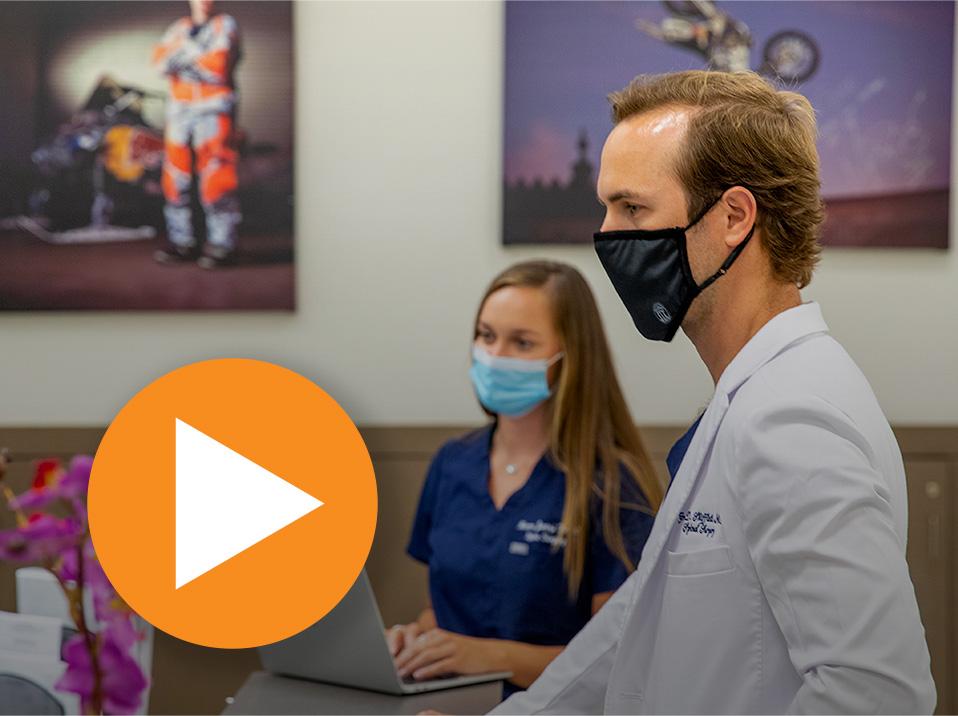Preparing for Surgery
WHAT YOU NEED TO KNOW:
Your Guide to Preparing for Spine Surgery
At DISC Sports & Spine Center, we understand that preparing for surgery can feel overwhelming at times, but we also believe knowing what to expect can put your mind at ease. We’ve developed this guide to walk you through the process and show you how we will be there to help you every step of the way.
There are a number of stages you’ll go through when preparing for surgery, and this guide is broken down to reflect that. You can choose to read through this all at once or just focus on where you currently stand in the process.
Either way, our goal is to provide you with the information you need to feel confident about your upcoming surgery.


Scheduling your Surgery
Generally, before even scheduling the surgery, you’ll already have had a consultation with one of our practitioners to discuss your options. Take some time to think it through, and if you decide surgery is the right choice, call our office to set up a date. If you have any additional questions about the procedure, feel free to ask at that time.
Many people also worry about how much they’ll have to pay out of pocket for surgery. It’s a good idea to check with your insurance company about coverage, but we can also help you with the process. We are in-network with most major providers and are happy to discuss treatment costs with you. We want you to be informed, so you know you are making a decision that works for you.
When scheduling my surgery, I
Understand also that your mind is powerful. Try to approach this surgery with a positive outlook, knowing that you are taking the right step towards improving your quality of life. Let us know if any concerns arise. It’s important that you feel educated and empowered in your choice.
Leading up to Surgery
After you schedule a date for your surgery, we will contact you to discuss the next steps. Have a list of all medications you are taking, including herbal supplements, vitamins, and anything over the counter. Certain medications need to be stopped 7-10 days before surgery, and we will review this list with you.
We’ll talk to you about getting preoperative clearance for surgery from your primary care doctor. This involves a medical history and physical exam, lab work, and an EKG. It has to be done within 14 days of surgery, so we’ll make sure you know after which date it can take place. We can also send all of the orders for the preop exam over to your doctor for you, so you don’t have to worry about a thing.
If you don’t have a primary care doctor or can’t get an appointment with yours within the right window of time, let us know. We can refer you to another doctor or help you get an appointment. Keep in mind, if you have certain medical conditions, you may need additional clearances from your specialist. For example, if you have heart disease, you may need surgical clearance from your cardiologist. We’ll let you know if that is necessary.
We’ll also review the details of your procedure and discuss what to expect in terms of recovery. We’ll talk about your activity restrictions after surgery so you can prepare for time off work or extra help at home if needed. We will also identify anything else you need to have on hand before your surgery. This will include a special antibacterial wash called Hibiclens that you’ll use the night before surgery, any postoperative medications, and any medical equipment or assistive devices that you may need.
We’ll confirm the time you need to check in to the surgical center the day of your procedure. (Note: This will be earlier than your scheduled surgery time.) We even have a 360-degree tour of our surgical center on our website, if it helps you to “see” it all beforehand.
Many of our patients live near our surgery center, making an early morning arrival on the day of surgery convenient. However, if you live further away, you can choose to stay in a nearby hotel the night before your procedure. Just let us know, and we can help direct you to a location near us.
On your end, know that the better you can optimize your health leading up to surgery, the better your recovery will be. If you smoke, it’s important to stop now. Eat a healthy diet—lean proteins can give you strength and help wounds heal, fruits and vegetables contain essential vitamins and minerals to assist your healing, and fiber can prevent uncomfortable constipation post-surgery. Drink lots of water to keep yourself well-hydrated. Get an adequate amount of sleep each night. Take a look around your house and think about your after-surgery needs. Will your bedroom and bathroom be easily accessible for you after surgery, or do you need to make other arrangements? Stock up on healthy premade or easy-to- assemble meals and other household essentials. Reach out to family members or friends to drive you the day of surgery and assist you when you return.
Leading up to surgery, I
When you’re about to have surgery, your diet may be the furthest thing from your mind. But what you eat before your procedure may help you recover faster. The best things to eat before surgery should be foods filled with all the nutrients that support healing and fight off infection.
Night before surgery
The evening before your procedure, you’ll want to shower with the liquid antibacterial Hibiclens and sleep in clean pajamas. Don’t shave or remove any hair near the area of your surgical site. We’ll take care of it at the time of surgery.
Unless otherwise instructed by your doctor, you’ll start fasting after midnight, meaning nothing to eat or drink after that time. Go to bed at a reasonable time so you’ll arrive rested and ready for the day!
The night before surgery, I
Frequent hand washing and good hygiene in the days before and after your surgical procedure is the No. 1 way you can
decrease your chance of developing a surgical site infection.
Morning of Surgery
When you wake up, remember that you are still fasting prior to your procedure. Dress in loose, comfortable clothing. Don’t put on any makeup, lotions, or perfumes. Wear your glasses rather than contact lenses, if you have them. Leave any valuables or jewelry at home.
Be sure to have your insurance information and photo ID. If you’d like, bring a book, magazine, or music to keep you occupied while you are waiting before your procedure or prior to discharge.
We encourage you to bring family or friends as you wish. It’s great to have loved ones with you for moral support.
Know that they can remain with you up until you are taken back to surgery and will be allowed back with you shortly after you are in recovery.
It’s important to arrive at your scheduled time. When you get to our surgery center, you’ll be checked in and taken to a place to wait until your procedure. You’ll speak to a number of staff members, including your nurse, anesthesiologist, and surgeon. You’ll have your vital signs checked and have an IV started. Your anesthesiologist and surgeon will explain how you’ll “go to sleep” during the procedure and what will take place afterward.

